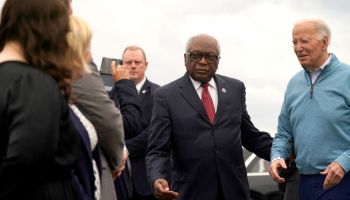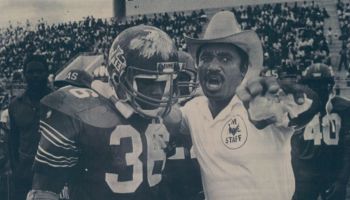WASHINGTON — Lawmakers are going another round in their fight to get a posthumous presidential pardon for the world’s first black heavyweight champion, who was imprisoned nearly a century ago because of his romantic ties with a white woman.
New York Rep. Peter King and Arizona Sen. John McCain, both Republicans, plan to reintroduce a congressional resolution urging a pardon for boxer Jack Johnson. Another supporter, Rep. Charles Rangel, D-N.Y., said he will talk to President Barack Obama’s new chief of staff, William Daley, and Attorney General Eric Holder about the cause.
ALSO: 25 Reasons We Love Michael Jordan
“It’s an injustice that shouldn’t fall through the cracks, and it looks like that’s exactly what happened here,” Rangel said.
Johnson became the first black heavyweight champion a century before Obama was elected the nation’s first black president. The boxer’s flamboyant lifestyle and his relationships with white women inflamed white sensibilities. Racial resentment boiled over after he defeated a white boxer in the “Fight of the Century” 100 years ago last summer. Three years later, Johnson was convicted of violating the Mann Act, which made it illegal to transport women across state lines for immoral purposes.
One of Johnson’s great-great nieces, Linda Haywood of Chicago, is writing to Obama about the case.
“I think having a letter from a family member will help put a face on our plea,” Haywood said. “Many people didn’t realize he had nieces and nephews. For years, the rest of my family was so ashamed, no one ever spoke of him because of the stigma attached to him being in prison.”
King said he was surprised that Obama didn’t act during the last session of Congress, when the House and Senate passed the resolution. But the congressman said he’s still optimistic.
“With last year’s elections, there seems to be a clear intent by the president to try to be more bipartisan,” King said. “Everything is there to correct an historic wrong and also, in a small way but significant way, help to bring the country together now.”
The White House declined to discuss the request for Johnson, citing a policy of not commenting on how pardon candidates are chosen. Obama, a former constitutional law professor who once taught a class on racism and the law, has not spoken publicly of the Johnson effort, but the Justice Department has come out against it.
In a letter to King and McCain at the end of 2009, the Justice Department attorney who advises on pardons argued that resources for such requests are best used for those still alive “who can truly benefit” from them. That notwithstanding, he noted, Obama certainly could pardon whomever he wishes.
Rapper Chuck D, a member of the pardon committee organized by documentary film maker Ken Burns, said he feels a presidential pardon is still possible, but unlikely any time soon. “I think President Obama’s pardon for something a hundred years ago will be at the tail end of his presidential run,” said Chuck D, whose real name is Carlton Ridenhour.
Last year, Obama pardoned nine people convicted of crimes including possessing drugs, counterfeiting and even mutilating coins. None was well-known.
The fact that Johnson wouldn’t personally benefit from the pardon is beside the point, argued another one of Johnson’s great-great nieces, Constance Hines of Chicago.
“This is about righting a wrong,” she said.
But P.S. Ruckman, Jr., a political science professor at Rock Valley College in Rockford, Ill., who writes a blog on pardons, said he agreed with the Justice Department’s position. “There are plenty of living persons with real problems who are deserving of clemency,” he said.
In their efforts to prosecute Johnson, authorities first targeted Johnson’s relationship with Lucille Cameron, who later became his wife, but she refused to cooperate. They then found another white witness, Belle Schreiber, to testify against him. Johnson fled the country after his conviction, but agreed years later to return and serve a 10-month jail sentence.
In his 2005 documentary, “Unforgivable Blackness: The Rise and Fall of Jack Johnson,” filmmaker Burns explored the case against Johnson and the sentencing judge’s admitted desire to “send a message” to black men about relationships with white women. Burns helped to form the Committee to Pardon Jack Johnson, which filed a petition with the Justice Department in 2004. The committee included celebrities such as Samuel L. Jackson and boxer Sugar Ray Leonard, as well as lawmakers like Rangel and McCain.
The effort went nowhere during the Bush administration. Burns, McCain and King revived it in 2009, confident that Obama would act on the request – especially after the resolution passed both houses of Congress for the first time.
The resolution urged that a pardon be issued “to expunge a racially motivated abuse of the prosecutorial authority of the federal government from the annals of criminal justice in the United States; and in recognition of the athletic and cultural contributions of Jack Johnson to society.”
King and McCain also plan to send letters to the Obama administration and name a separate boxing reform bill for Johnson.
“John McCain and I do feel seriously about it,” said King, who like McCain has sparred in the ring. “We want to keep the issue alive, and it also may give more momentum to the boxing reform bill.”
Johnson won the world championship on Dec. 26, 1908. Police in Australia stopped Johnson’s fight against the severely battered Canadian world champion, Tommy Burns, in the 14th-round, leading to a search for a “Great White Hope” who could beat Johnson.
Two years later, Jim Jeffries, the American world titleholder Johnson had tried to fight for years, came out of retirement to challenge Johnson for the championship in a 45-round “Fight of the Century.” They squared off on a scorching Independence Day in Reno, Nev., at a stadium that had been quickly constructed for the match. Johnson won, but deadly race riots ensued, as angry whites took out their frustrations on blacks, especially those who had celebrated Johnson’s victory.
A July 6, 1910, Los Angeles Times editorial, published two days after the fight, counseled blacks: “Do not point your nose too high. Do not swell your chest too much. Do not boast too loudly. Do not be puffed up … Remember you have done nothing at all. You are just the same member of society today you were last week.”
Geoffrey C. Ward, who wrote the screenplay for the documentary as well as the biography by the same title, said he’s still hopeful Obama will grant the pardon.
“In recent years, we’ve been very good about admitting past wrongs,” said Ward. “I don’t see what harm it does to do this.”
VIDEO:























